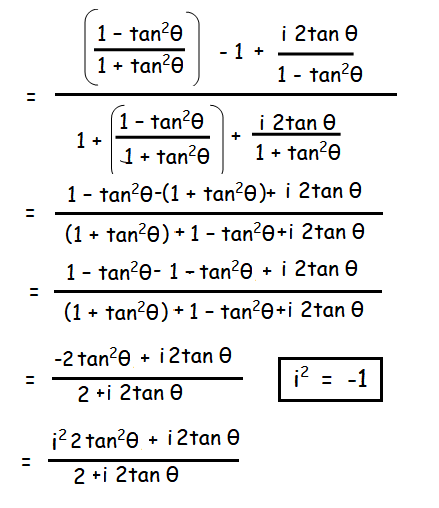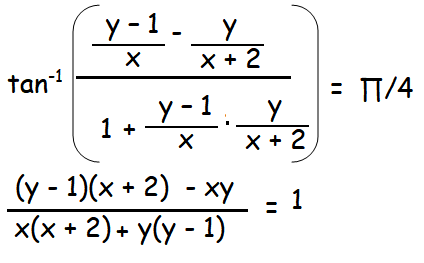COMPLEX NUMBERS PRACTICE PROBLEMS
Subscribe to our ▶️ YouTube channel 🔴 for the latest videos, updates, and tips.
Problem 1 :
If (1 + z)/(1 - z) = cos 2θ + i sin 2θ, show that z = i tan θ
Solution :
(1 + z)/(1 - z) = cos 2θ + i sin 2θ
1 + z = (1 - z)(cos 2θ + i sin 2θ)
1 + z = (cos 2θ + i sin 2θ) - z(cos 2θ + i sin 2θ)
z + z(cos 2θ + i sin 2θ) = (cos 2θ + i sin 2θ) - 1
z(1 + (cos 2θ + i sin 2θ)) = (cos 2θ + i sin 2θ) - 1
z = (cos 2θ + i sin 2θ) - 1/(1 + (cos 2θ + i sin 2θ))
z = (cos 2θ - 1) + i sin 2θ)/((1 + cos 2θ) + i sin 2θ))
cos 2θ = (1 - tan2θ)/(1 + tan2θ)
sin 2θ = 2tanθ/(1 - tan2θ)

= i 2 tan θ (i tan θ + 1)/2(1 + i tan θ)
= i tan θ ------- R.H.S
Hence proved.
Problem 2 :
If cos α + cos β + cos γ = sin α + sin β + sin γ = 0, show that
(i) cos 3α + cos 3β + cos 3γ = 3 cos (α + β + γ) and
(ii) sin 3α + sin 3β + sin 3γ = 3 sin (α + β + γ)
Solution :
Let a = cos α + i sin α,
b = cos β + i sin β and c = cos γ + i sin γ
a3 = (cos α + i sin α)3
b3 = (cos β + i sin β)3
c3 = (cos γ + i sin γ)3
Using De moivre's theorem
a3 = (cos 3α + i sin 3α) ---(1)
b3 = (cos 3β + i sin 3β) ---(2)
c3 = (cos 3γ + i sin 3γ) ---(3)
Algebraic formula :
a3 + b3 + c3 - 3abc = (a+b+c) (a2 + b2 + c2 - ab - bc - ca)
If a + b + c = 0, then
a3 + b3 + c3 = 3abc
Here
a + b + c = cos α + i sin α + cos β + i sin β + cos γ + i sin γ
a + b + c = (cos α + cos β + cos γ) + i (sin α + sin β + sin γ)
a + b + c = 0
(1) + (2) + (3)
a3 + b3 + c3 = 3abc
(cos 3α + i sin 3α) + (cos 3β + i sin 3β) + (cos 3γ + i sin 3γ)
= 3 (cos α + i sin α)(cos β + i sin β) (cos γ + i sin γ)
= 3 [cos (α + β + γ) + i sin (α + β + γ)]
= 3 cos (α + β + γ) + i 3 sin (α + β + γ)
Equating the real parts, we get
cos 3α + cos 3β + cos 3γ = 3 cos (α + β + γ)
By equating the imaginary parts, we get
sin 3α + sin 3β + sin 3γ = 3 sin (α + β + γ)
Hence proved.
Problem 3 :
If z = x + iy and arg [(z - i)/(z + 2)] = π/4, show that x2 + y2 + 3x − 3y + 2 = 0.
Solution :
arg [(z - i)/(z + 2)] = arg (z - i) - arg (z + 2)
= arg (x + iy - i) - arg (x + iy + 2)
= arg (x + i(y - 1)) - arg ((x + 2) + iy)
= tan-1 [(y - 1)/x] - tan-1 [y/(x + 2)]
tan-1 A - tan-1 B = tan-1 [(A - B)/ (1 + AB)]
Here A = (y - 1)/x and B = y/(x + 2)

xy + 2y - x - 2 - xy = x2 + 2x + y2 - y
x2 + 2x + x + y2 - y - 2y + 2 = 0
x2 + y2 + 3x - 3y + 2 = 0
Subscribe to our ▶️ YouTube channel 🔴 for the latest videos, updates, and tips.
Kindly mail your feedback to v4formath@gmail.com
We always appreciate your feedback.
About Us | Contact Us | Privacy Policy
©All rights reserved. onlinemath4all.com

Recent Articles
-
Digital SAT Math Problems and Solutions (Part - 1)
Feb 05, 26 09:37 AM
Digital SAT Math Problems and Solutions (Part - 1) -
AP Precalculus Problems and Solutions
Feb 05, 26 06:41 AM
AP Precalculus Problems and Solutions -
SAT Math Preparation with Hard Questions
Feb 05, 26 05:30 AM
SAT Math Preparation with Hard Questions

